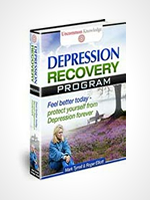Side Effects of Antidepressants
"The main reason for people stopping a course of depression medication is the side effects of the antidepressant."
IT IS BECOMING clearer and clearer that antidepressants are far from benign drugs. And unfortunately, the combination of depression and medication, as well as still being very much trial and error, has some unique worries due to the nature of the condition itself.
As with all drugs some people react badly to antidepressants, whilst side effects can seem quite mild in others. The irony here of course is that, helpful as antidepressants may be for some people at some times, these side effects can be very depressing in themselves.
Because no one antidepressant has been proven to be any more effective than any other, the choice of which drug to prescribe often rests on their different side effects!
The overwhelming popularity of SSRIs (selective serotonin reuptake inhibitors) was in part due to their apparent "safety" over more toxic drugs when used improperly. Some of the Tricyclics are extremely toxic in overdose, such as Dothiepin, Amitriptyline and Imiprimine.
However, in addition to other dangers, there is also an established direct link between suicide and violent behaviour and the use of SSRIs. (1)
Actually, all the effects, even the desired effects, can be considered a side effect of taking a pill. The reason there are so many side effects with antidepressants, is really due to the lack of full understanding about how antidepressants, and depression, affect the brain.
This can be very different from case to case. Even the drug companies themselves admit that they don't quite know how the drugs work! (2)
Antidepressant treatment is often very much "a sledgehammer to crack a nut", especially in cases of mild to moderate depression. Bombarding an incredibly delicate and well balanced system with external chemicals on a long-term basis is bound to create unpleasant side effects. One of the desired side effects is to change the mood of the person taking the antidepressant.
St John's Wort (hypericum) has been shown to be as effective as antidepressants, and have fewer side effects. (3,4)
Some of the various side effects from the different antidepressants are:
- Dry mouth
- Urinary retention
- Blurred vision
- Constipation
- Sedation (can interfere with driving or operating machinery)
- Sleep disruption
- Weight gain
- Headache
- Nausea
- Gastrointestinal disturbance/diarrhea
- Abdominal pain
- Inability to achieve an erection
- Inability to achieve an orgasm (men and women)
- Loss of libido
- Agitation
- Anxiety
See below for the side effects of specific antidepressant types.
Uncovering the new truths about SSRIs
One of the reasons that SSRIs (including Paxil, Prozac, Luvox, Zoloft, Celexa) are so widely prescribed by doctors and psychiatrists is because they are safer in overdose. This is obviously a good thing because traditionally the most common form of suicide was to overdose on the very antidepressants which were meant to help relieve the depression.
However, there are two very real dangers with Sari: one that has recently been the basis of an historic court battle in the US.
- SSRIs pose greater risks when taken with other drugs, due to their pharmacokinetic and pharmacodynamic properties. For example, SSRIs can be lethal when taken with MAOIs.
- While being safer in overdose, SSRIs have actually been proven to increase thoughts of suicide or self harm.
Other side effects of SSRIs
Nausea, diarrhea, headaches. Sexual side effects are also common with SSRIs, such as loss of libido, failure to reach orgasm and erectile problems. Seratonergic syndrome is also a worrying condition associated with the use of SSRIs.
Side effects of TCAs (tricyclic antidepressants)
Fairly common side effects include dry mouth, blurred vision, drowsiness, dizziness, and tremors sexual problems, blurred vision, dizziness, drowsiness, skin rash, and weight gain or loss.
Side effects of MAOIs (monoamine oxidase inhibitors)
Rare side effects of MAOIs like phenelzine (brand name: Nardil) and tranylcypromine (brand name: Parnate) include liver inflammation, heart attack, stroke, and seizures.
Individuals taking MAOIs may have to be careful about eating certain smoked, fermented, or pickled foods, drinking certain beverages, or taking some medications because they can cause severe high blood pressure in combination with the medication. A range of other, less serious side effects occur including weight gain, constipation, dry mouth, dizziness, headache, drowsiness, insomnia, and sexual side effects (problems with arousal or satisfaction).
SSRIs, and SNRIs tend to have fewer and different side effects, such as nausea, nervousness, insomnia, diarrhea, rash, agitation, or sexual side effects (problems with arousal or satisfaction).
Bupropion generally causes fewer common side effects than TCAs and MAOIs. Its possible side effects include restlessness, insomnia, headache or a worsening of preexisting migraine conditions, tremor, dry mouth, agitation, confusion, rapid heartbeat, dizziness, nausea, constipation, menstrual complaints, and rash.
Bupropion (Wellbutrin) was temporarily removed from the market after its initial release due to the occurrence of seizures in some patients. However, further investigation showed that seizures were primarily associated with high doses (above the current maximum recommended dose of 450 mg/day), a history of seizures or brain trauma, an eating disorder, excessive alcohol use, or taking other drugs that can also increase the risk for seizures. With new warnings and lower recommended doses, the chance of having seizures has been greatly reduced.
Related: Symptom-free withdrawal from Venlafaxine
More info: Website on the side effects of antidepressants
Next article: Alternative Treatments for Depression
So, if you're concerned about the side effects of medication, or would like to know about other ways of controlling and curing depression, take a look at what the researchsays about alternative treatments for depression...
- Glenmullen, J. (2000) Prozac Backlash: overcoming the dangers of Prozac, Zoloft, Paxil, and other antidepressants with safe, effective alternatives. Simon & Schuster.
- Dubovsky, S. L. (1997) Mind-Body Deceptions: the psychosomatics of everyday life. WW Norton & Co.
- Linde, K., Ramirex, G., Mulrow, C. D., Pauls, A., Weidenhammer, W., Melchart, D. (1996) St John’s wort for depression: an overview and meta-analysis of randomized clinical trials. British Medical Journal, 313, 253–258.
- Woelk, H. (2000) Comparison of St John’s wort and imipramine for treating depression: randomised controlled trial. British Medical Journal, September 2.







